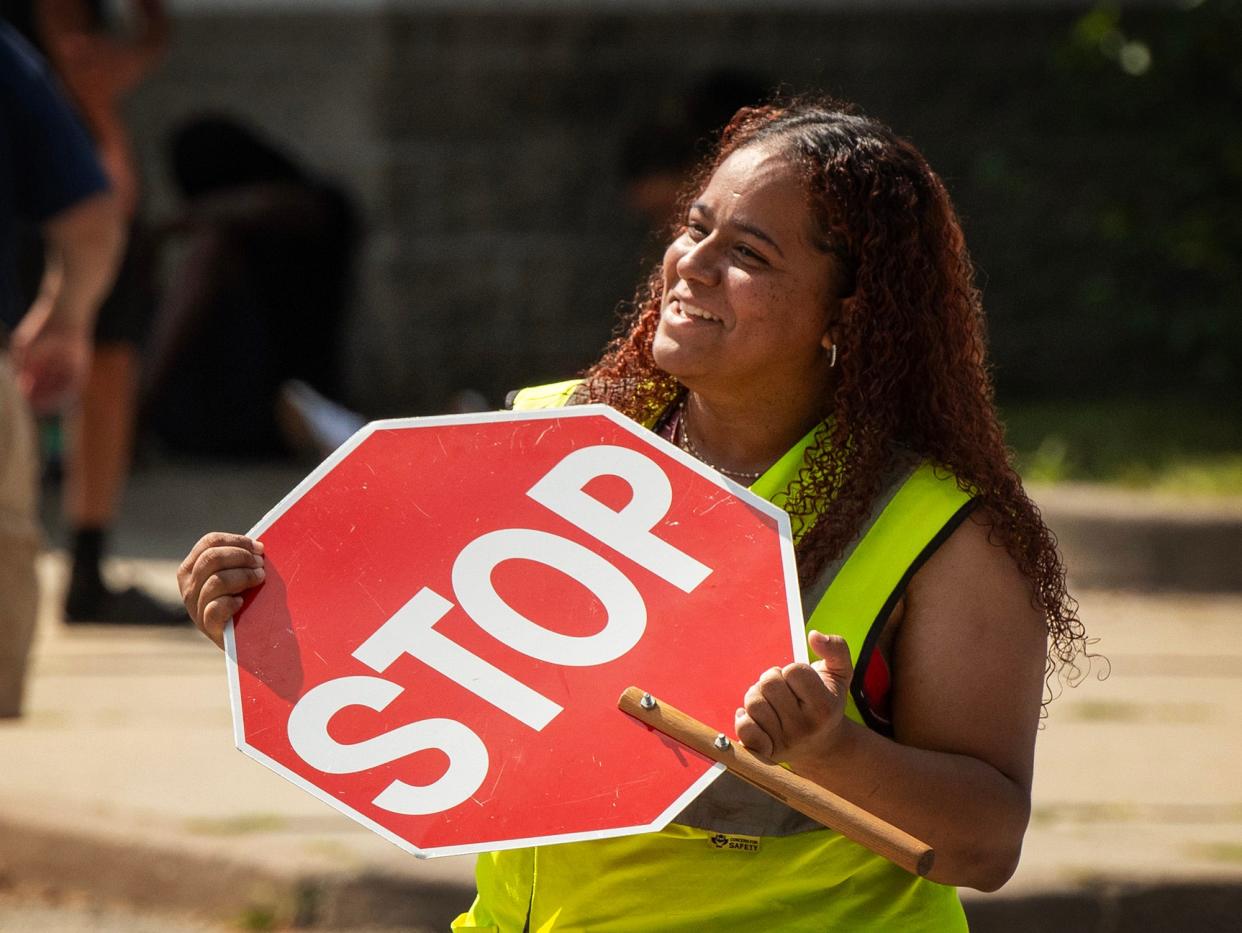Boiling point: Worcester parents demand AC in school buildings
WORCESTER – When classes ended Thursday at City View Discovery Elementary School, fifth grader Jaizir Remillard needed an immediate cooldown.
Friends and family who waited outside the school to pick up their kids showered Jaizir with ice-cold water from their water bottles.

“It’s 900 degrees,” said the 10-year-old Remillard of his day inside the school, a health challenge since he suffers from asthma. “Fans don’t work for me. I wish we had more (fans) and AC and stuff.”
City View, like many aging schools in Worcester, doesn't have air conditioning. Parents said fans were brought in to give students some relief on Thursday when Worcester hit a high temperature of 90 degrees, matching an all-time high in the city for Sept. 7.
Classes ended three hours early Thursday and Friday because of the elevated heat, while much of Massachusetts was in a heat advisory set by the National Weather Service.
Frustration sets in
Jaizir’s mother, Gina Remillard, like many parents who waited in the sweltering heat to pick up their kids, was frustrated. Remillard believes the School Department had years to fix the problem of no air conditioning in some schools and wants to know why the work wasn’t done.
“My son has asthma, and a lot of schools don’t have good air conditioning. A lot of school buildings are old,” said Gina Remillard. She acknowledged the three-hour early release was the right decision by school officials to protect the health of students. But, it doesn’t exonerate school officials from fixing the problem.
“We need to update the air conditioning in the schools. My son, he’s miserable. He’s irritable,” said Remillard.
Talks underway; fixes will take time
The district is starting conversations with the city to get a full picture of what buildings need, said Superintendent Rachel Monárrez during Thursday’s night’s School Committee meeting.
Improvements will take time, said Monárrez, as she will work with the School Committee and the state to find solutions.
“We need to keep seeking opportunities to really address these inequities that exist in our schools,” said Monárrez during the meeting, a reference to some schools that don’t have air conditioning. “It’s the hardest decision to (close schools early) when you know you’ve got some schools that actually have air, and they can conduct school with no problem.
"And then you have a vast majority who don’t — and then throw in the athletics to that — no one should have to make those kinds of decisions during this time and age and yet we do.”
80% of school buildings lack AC
Forty of the 50 public school buildings in Worcester don’t have air conditioning — 10 have full AC — because many were built decades ago before the risk of elevated heat became an issue due to climate change.
The average age of Worcester’s school buildings is 75 years, even taking into account ones like the new Doherty Memorial High School that is under construction, said Brian Allen, the district's chief financial and operations officer..
That advanced age means teachers inside the buildings are also feeling the heat. One teacher reported a classroom temperature of 91.5 degrees, said Melissa Verdier, president of the Education Association of Worcester, the city’s teachers union.
Verdier taught at North High for more than 20 years and doesn’t remember classrooms ever getting as hot as 90 degrees.
“It’s just a difficult situation to put students in for learning. It’s a difficult situation to put educators in for that kind of heat for a full day,” said Verdier. “I’m happy to say (school officials) did make the right decision, in my opinion, to close early.”
A lot of questions. Are there answers?
Several questions arise as climate change warms the planet and more extreme heat is likely headed Worcester's way: Will schools close early the next time oppressive heat descends on the city? What is the plan to get cooling systems in the schools so valuable learning time isn’t lost because of early dismissals?
Complete modernization of school buildings is a priority, said Allen, adding that discussions are happening with City Manager Eric Batista and state lawmakers to figure out where the money will come from to cover costs. Especially for installing air conditioning as part of modernization of existing buildings, because the Massachusetts School Building Authority doesn't pay for that work, according to a School Department spokesman.
How much total modernization will cost is currently unknown, because decisions need to be made on whether buildings will be updated or replaced. A 2016 facility assessment identified $77 million for deferred maintenance of critical items.
“But we know (that amount) will be much more for replacing schools and systems in schools,” said Allen.

As for how long the modernization will take, that’s also unclear. Allen explained it’s a multipronged approach, and one avenue is going to the Massachusetts School Building Authority for cash reimbursement for projects.
The MSBA core program funds new buildings, additions or major renovations. Its accelerated repair program only pays for new windows, roofs and boilers. Both programs are “competitive,” said Matt Donovan, director of administration and operations at the MSBA. The quasi-independent government authority receives between 100-120 “statements of interest” every year from school districts.
The statement of interest is just the first step. The MSBA whittles them down to the ones it has a keen interest in, and when that happens, it's time for the districts to develop building design plans and cost estimates.
Some work already started
Allen explained some modernization work is underway, including installation of energy-efficient heat pumps this year and next that will cost a total of $22 million. The funds come from federal COVID-19 relief money sent to the states for educational purposes.
There are also discussions to determine if tax revenues collected from the Massachusetts “millionaire's tax” can be used for modernization.
Top priority: New Burncoat High
With all the talk of complete modernization, Allen said the district’s "priority project" is getting a new Burncoat High School. The aging building dates back to the 1960s, and Worcester submitted a total of 13 statements of interest over the years to the MSBA, including one this year.
Allen declined to speculate why the MSBA hasn’t approved it, but he commented on the challenge facing Worcester students and families with 40 buildings that don’t have air conditioning.
“We have identified modernization of buildings as a high priority as we work with all legislative bodies and the city side to identify resources,” said Allen. “We recognize the need to upgrade buildings to be exceptional learning environments for all of our students.”
“It comes down to resouces. That is the challenge.”
Does extreme heat impact learning?
Nate Bowens, a City View School parent who poured cold water over the young Remillard's head, believes extreme heat in the building impacts his fourth-grade daughter's ability to learn.
"When it gets this hot, you don't want to work," said Bowens.
A research study could back that statement up. WPI professor Shichao Liu was part of a research study published in the International Journal of Building Science and Its Applications that showed a direct connection between air temperature and cognitive function.
One finding showed a nearly 3% decline in memory function when air temperature increased from 73 to 80 degrees. Reasoning ability dropped 11% at 80 degrees, compared to 73.
Liu stressed that research shows heat affects students differently, and there isn’t an optimal building temperature for everyone. However, he pointed out that uncomfortable heat inside buildings can result in short-term impacts like heat exhaustion and trauma, which could have lasting impacts for students.
“The long-term effects could be something people have to pay attention to,” said Liu.
Message from parents: Time to take action
Gina Remillard and other parents are paying attention to the heat, and they want school leaders to take action to make buildings cooler.
“You’re taking educational time away from the kids because (the district) has not updated systems. Three hours of learning is lost because of the district not doing something they should have done," she said.
“The schools need to step up their game. They need to do better. Nobody should miss school because it's too hot.”
Reporter Jeff Chamer contributed to this report.
Contact Henry Schwan at henry.schwan@telegram.com. Follow him on X: @henrytelegram.
This article originally appeared on Telegram & Gazette: Worcester parents demand air conditioning in school buildings


